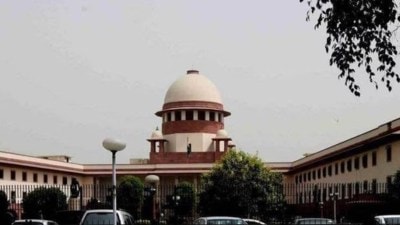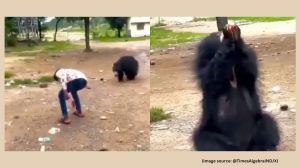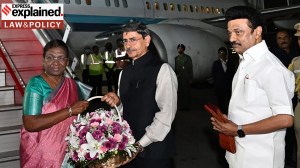Blasts in Karbala, Najaf kill 62
Suicide car bombers struck Iraq’s two main Shi’ite holy cities of Najaf and Karbala on Sunday, killing at least 62 people and woun...

Suicide car bombers struck Iraq’s two main Shi’ite holy cities of Najaf and Karbala on Sunday, killing at least 62 people and wounding nearly 130, in coordinated attacks.
Both bombs, which went off about two hours apart, exploded near crowded bus stations in an apparently coordinated attempt to cause as much bloodshed as possible among Shi’ites.
Earlier in Baghdad, gunmen killed three Electoral Commission employees after hauling them from a car on a busy street.
The bomb blasts were not far from important shrines — the Imam Ali mosque in Najaf and Imam Hussein mosque in Karbala. The attacks appeared designed to provoke sectarian conflict with Saddam Hussein’s long-dominant Sunni minority. Shi’ite leaders called on their people not to reply in kind.
In Najaf, the suicide bomber detonated his vehicle about 300 metres from the Imam Ali shrine, near crowds of people queuing for buses and taxis.
Medical officials said there were at least 48 dead and 90 wounded in the blast, which left stunned crowds waiting in freezing temperatures for ambulances. Police imposed a curfew in Najaf’s old city.
In Karbala, where a suicide bomber stuck about two hours earlier, the main hospital said 14 people were killed and 39 wounded. A hospital official said all appeared to be civilians with many women and children among them.
A Reuters cameraman said the ground around the bus station was littered with dead and wounded. The explosion left a deep crater and blew out windows and shop fronts, showering the area with broken glass.
Shi’ite religious leaders say they will not be provoked by bombs and reject accusations by some secular opponents that they want to install an Iranian-style Shi’ite theocracy.
‘‘They are trying to ignite a sectarian civil war and prevent elections from going ahead on time. They have failed before and they will fail again,’’ said Mohammad Bahr al-Uloum, one of Iraq’s most respected Shi’ite clerics.
‘‘The Shi’ites are committed not to respond with violence, which will only lead to violence. We are determined on elections and Ayatollah Ali al-Sistani has made this clear.’’
In Baghdad on Sunday, gunmen dragged three junior Electoral Commission employees from a car and shot them dead in broad daylight, although it was not clear if they were targeted because of their work, a Commission spokesman said. Witnesses said insurgents had opened fire on the vehicle first. Two other Commission employees escaped.
Separately, four Kurds were killed by gunmen in Hawija, southwest of Kirkuk.
In another incident, militants kidnapped and are threatening to kill 10 Iraqis employed by a US security company unless the firm pulls out of Iraq, a caller from the militants told Reuters.
The tape, broadcast by Al Arabiya and Al Jazeera on Sunday, was attributed to three Iraqi insurgent groups and showed blindfolded hostages sitting against a wall. It included a plea from one of the hostages for Iraqis to stop cooperating with US forces and the US-backed Iraqi administration.
It was not clear when the men were kidnapped. No deadline appears to have been set for the threats to be carried out.
Meanwhile, deposed Iraqi President Saddam Hussein is preparing a legal challenge in the US to his trial for war crimes. The advice to take the case to US courts is contained in a 50-page brief prepared by Clive Stafford Smith, a leading British human rights lawyer and intends to ensure that Saddam receives the basic legal rights given to those tried in America, such as full access to his defence team and an independent judge and jury, a media report said today.
The leaked brief, entitled ‘The Iraqi Special Tribunal as Victors’ Justice — the Inherent Illegality and Bias of the Whole Process’, argued that US law should prevail in the case because the trial is effectively being taken at the behest of the Americans, The Sunday Times reported.
Photos




- 01
- 02
- 03
- 04
- 05



























